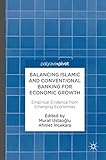Balancing Islamic and conventional banking for economic growth : empirical evidence from emerging economies / Murat Ustaoğlu, Ahmet İncekara, Editors.
Material type: TextPublication details: Cham : Springer International Publishing, (c)2017.Description: 1 online resource (143 pages)Content type:
TextPublication details: Cham : Springer International Publishing, (c)2017.Description: 1 online resource (143 pages)Content type: - text
- computer
- online resource
- 9783319595542
- 3319595547
- HG3368 .B353 2017
- COPYRIGHT NOT covered - Click this link to request copyright permission: https://lib.ciu.edu/copyright-request-form
| Item type | Current library | Collection | Call number | URL | Status | Date due | Barcode | |
|---|---|---|---|---|---|---|---|---|
 Online Book (LOGIN USING YOUR MY CIU LOGIN AND PASSWORD)
Online Book (LOGIN USING YOUR MY CIU LOGIN AND PASSWORD)
|
G. Allen Fleece Library ONLINE | Non-fiction | HG3368.6 (Browse shelf(Opens below)) | Link to resource | Available | ocn995774838 |
Browsing G. Allen Fleece Library shelves, Shelving location: ONLINE, Collection: Non-fiction Close shelf browser (Hides shelf browser)
Preface; Acknowledgements; Contents; Editors and Contributors; List of Tables; Chapter 1 Introduction ; Abstract ; Introduction; References; Chapter 2 Dual Banking Systems' Dynamics and a Brief Development History of Islamic Finance in Select Emerging Islamic Economies ; Abstract ; Introduction; Dual Banking and Islamic Finance in Global Economy; Criticisms Against Islamic Finance and Some Common Problems; The Basic Financing Tools of Islamic Finance; Financial Sector and Islamic Finance in Turkey; Islamic Banking in Malaysia; Islamic Finance Sector's Development in Indonesia.
Dual Banking System and Islamic Finance in QatarReferences; Chapter 3 Financing Economic Growth in Emerging Economies: A Theoretical Approach ; Abstract ; Introduction; Financial System and Economy; Literature for Finance and Economic Growth Relations: Conventional Finance; Islamic Finance and Economic Growth; Finance and Economic Growth Relation in Theory; Economic Growth and Finance Nexus in Emerging Economies; References; Chapter 4 The Turkish Economy and Financing Growth by Dual Banking: Empirical Evidence ; Abstract ; Introduction; Economic Transition from Ottoman Era to Republic.
Growth Policies of Young Republic: Great Depression EraEconomic Policies Implemented in the Process of Membership in NATO; Post-Keynesian Era and Liberalization; Agriculture Industry; Manufacturing Industry; Empirical Analysis; Variables and Data; Econometric Method; Econometric Analysis; References; Chapter 5 Financing Economic Growth by Dual Banking in Malaysia: Empirical Evidence ; Abstract ; Introduction; The Economic Policies; Agricultural Sector; Industrial Sector; Tourism and Construction Sectors; Scope of the Work; Empirical Evidence; References.
Chapter 6 A Quantitative Reassessment of the Dual Banking-Growth Nexus in Indonesia: Comparative Analysis Abstract ; Introduction; Brief History of Indonesian Economy; Natural Resources; Human Resources; Reforms Programmes; Growth Dynamics; Scope of the Work; Econometric Analysis; References; Chapter 7 Economic Development and Financing Growth in a Hydrocarbon Economy: Qatar ; Abstract ; Introduction; A Hydrocarbon Economy; Brief History and Structural Changes; Development of Gas and Oil Sector; Labour Market and Education Policy; Scope of the Work; Variables and Data; Econometric Analysis.
This Palgrave Pivot empirically analyzes the role of conventional and interest-free Islamic banking in the growth process of developing Islamic nations. After explaining the theoretical background of this dual banking system structure, the book then empirically analyzes growth in a variety of sectors - such as agriculture, manufacturing, and tourism - in the predominantly Muslim countries of Turkey, Malaysia, Indonesia, and Qatar.
COPYRIGHT NOT covered - Click this link to request copyright permission:
There are no comments on this title.







